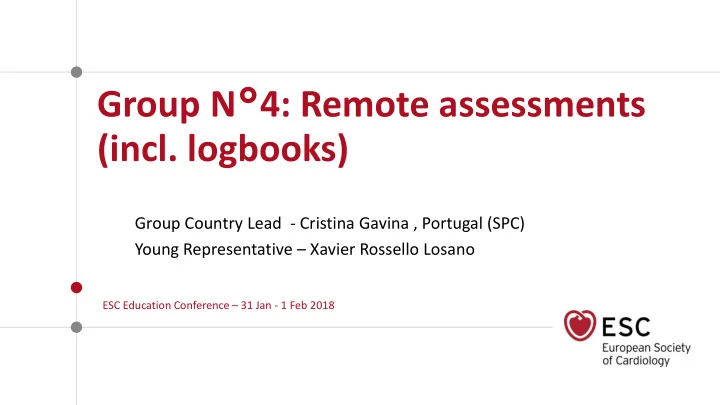

Group N ° 4: Remote assessments (incl. logbooks) Group Country Lead - Cristina Gavina , Portugal (SPC) Young Representative – Xavier Rossello Losano ESC Education Conference – 31 Jan - 1 Feb 2018
Group 4: Remote assessments : Current use, challenges and limitations Current use Challenges Limitations 1. NO remote mentoring . Data base of National mentors Geographic challenges for training R emote 2. some countries have : . Specific training on mentoring Rewarding is national-based and not ESC mentoring . local mentors but . Facilitate exchange of mentors dependent . without specific training across countries . most of them Not rewarded) . Rewards 1. NO Coordinate and harmonize . In most of European Countries Remote exit 2. Some countries have : general Cardiology certification certification programs are dependent on certification mandatory exit certification at national and european level National Medical Boards or Health Final exam with an appointed national jury Ministries who are not interested in the Remote CME possibility of loosing control of this process 3. NO CME peer or national assessed/ ( except Development of CME digital At a national level this is not a UK) recorded activity and metrics requirement for most of the countries, so the need is not individually perceived Not Digital Digital recording to be certified by National Medical Board or health Logbook (some mandatory directly-observed procedural local directors ministry would keep in their role in the skills and paper logbooks) selection of local directors Few using ! . Have to create the need . technical problems (ex: convert to PDF) Using ESCel . Invest on a better platform . Lack of national mentors . Not mandatory - usefulness percetion
Remote assessments: Opportunities for the future & role of the ESC Harmonizing EU education through digital means : • Remote mentoring a) training mentors program; b) remote mentors list available in a ESC platform ; c) Reward ? • Certification (cardiologists in training) a) ESCel – implement it ´ s value through recognition from NCS and National Medical boards b) European exam (EEGC) implementation : as a first step of the final certification a as “EEGC = assumed as “a certification of knowledge” and keeping the final part (proficiency certification) within the medical national boards / health ministries c) ESC approach to NCS and National Medical Boards to introduce the EEGC exam as part of the national certification program . European opinion leaders to make scientific and practical advertisement . Through European commission d) ESC Exam Promotion : as reward : full membership as a ESC reward or as a obstacle : being needed for grants application or for taking part into working groups or associations boards in collaboration with NCS through NCS Congress – prime time ” joint sessions” e) ESC EXAM translation into English / French / German ( usefulness – doubts !) Need to listen to French and German representatives Re- certification (cardiologists in practice) a) structured self-assessment trough credits obtained in CME (every 4 yrs) Logbook – digital; more practical; standardized ; numbers have to be equalized even in countries that have less than 4 years of Cardiology training but follow the ESC Core Curriculum
Remote assessments: Opportunities for the future & role of the ESC Remote Remote testing and E-Logbook mentoring certification ESC/NCS Training Cardiologists in training Cardiologists in-practice Digital Coordinate and harmonize Development of CME digital mentors program More practical general Cardiology recorded activity and Standardized across certification at national and metrics , standardized and Remote mentors list countries European level ( ESCel, structured available in a ESC European exam in General platform Cardiology) through NCS and National Medical Chambers and Health Ministries
Recommend
More recommend